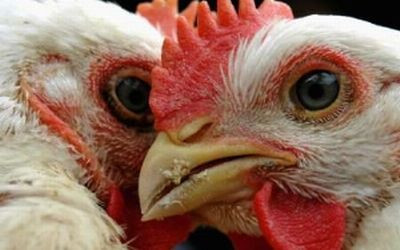Not A Poultry Amount: Brazil And South Africa’s Trade War Over Chickens

Two of the world’s most dynamic and promising emerging markets, Brazil and South Africa, are fighting over … chickens.
South Africa, which joined the much-heralded BRIC nations of dominant emerging countries last year, has charged that Brazil is damaging its poultry industry by dumping too many of its cheaply priced, fine-feathered birds onto its market, endangering jobs.
BBC reported that chicken farming has long been one of South Africa’s most successful businesses, as more than 1 billion birds are consumed annually in the country, more than double the amount of beef. But their share of the domestic market has been dramatically cut as Brazil’s chicken exports surged 40 percent in just one year.
South Africa’s poultry industry provides jobs for more than 48,000 people (and nearly 60,000 jobs indirectly). But industry specialists worry that 3,000 such jobs could disappear in the coming months due to the influx of Brazilian birds.
Astral Foods, the second-largest chicken producer in South Africa, has already laid off 150 people in the past few weeks, citing "cutbacks on production" that were prompted by higher grain prices and rising imports.
Jobs are an extremely sensitive matter in South Africa, where at least one-fourth of the labor force is unemployed (the overall figure for black youths is believed to be much higher).
"We cannot afford to have chicken dumped in South Africa. Our people are losing jobs, our companies are losing profits. It will impact negatively on the country's economy," Tumi Mokwene, a small poultry farmer, told BBC.
"In our farm, we've had to change our business model in order to survive, and in the process we had to tell some of our employees that we can no longer keep them on … The threat to jobs is very real. We need to look at ways of ensuring that the industry is sustainable -- this is where the government needs to play an active role.”
Brazil is the world’s largest poultry exporter -- last year, about 60 percent of all chickens imported to South Africa came from Brazil.
According to the U.S. Department of Agriculture, Brazil is expected to produce 13.3 million metric tons of poultry products this year, which would represent a 3 percent boost from 2011.
“There is too much chicken floating around in South Africa, so there’s a depressed market and the prices are unnaturally low,” Kevin Lovell, CEO of the South African Poultry Association, told Bloomberg last month.
“I would say that most of the [South African] companies are either running at a loss or very close to doing that at present with the current pricing levels.”
The trade conflict has led Brazil to deny the accusation and it is now consulting with the World Trade Organization (WTO) over the fowl matter.
"It is a big deal for us as Brazilians. We are not dumping [chickens], we are not undercutting. If we don't take any action, we will be saying other countries are right in accusing us of dumping," Pedro Luiz Carneiro de Mendoca, Brazil's ambassador to South Africa, told the BBC.
South Africa had imposed a tariff on chicken importers, but they were removed last month, much to the consternation of South African poultry farmers.
It is unclear if these bird wars will significantly hurt trade relations between Johannesburg and Brasilia.
Trade between Brazil and South Africa has quadrupled since 2001, according to the Trade & Industrial Policy Strategies think-tank.
Siphamandla Zondi, head of the independent foreign policy think-tank Institute for Global Dialogue, told BBC: "Both countries are emerging economies and there are bound to be complexities in trade relations here, but these need to be managed strategically.”
He added: "Brazil has got to look for new markets because the traditional markets have problems and that may hit South Africa where it hurts the most, but that is the nature of international economic trade, it is about taking competitive advantage where you have it.”
Brazil and Africa have deep historical and cultural ties, owing largely to the slave trade of the 16th and 17th centuries.
Brazil, weary of sluggish markets in Europe and North America, has increasingly focused on Africa as a new market for its goods.
Christina Stolte, research at the German Institute for Global and Area Studies, told CNN: “Being a resource-rich country and a future major oil exporter itself, Brazil is not pursuing a strategy to secure resources. Rather, the [Brazilian] economy is seeing Africa as a means of diversifying its export markets -- for food, seeds, agricultural machinery -- and internationalizing the production of its big companies.”
She added: "The fact that the majority of Brazil's population is of Afro-Brazilian origin -- making Brazil the world's largest black population after Nigeria -- is frequently quoted by the, almost exclusively white, governing elite of Brazil in order to stress Brazil's cultural similarities with the African countries."
© Copyright IBTimes 2024. All rights reserved.





















